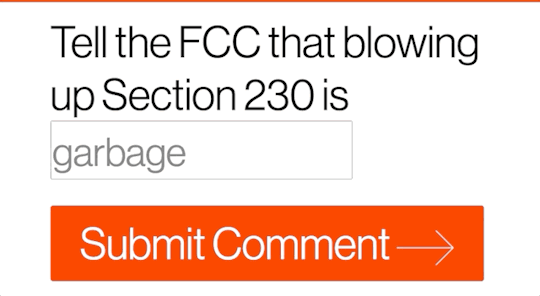Digital rights activists launch new campaign to stop Trump executive order that would censor the Internet

FOR IMMEDIATE RELEASE: September 10, 2020
Contact: press@fightforthefuture.org, (508) 474-5248
Telecom giant AT&T and an anti-LGBTQ hate group are backing the White House order that would gut Section 230. Fight for the Future plans to drive comments to the FCC opposing it.
Digital rights group Fight for the Future, known for organizing the largest online protests in human history and driving record numbers of comments to the FCC in support of net neutrality, is launching a new campaign to stop a White House executive order that would gut Section 230 of the Communications Decency Act, put the FCC and FTC in charge of policing online speech, and open the floodgates for widespread Internet censorship.
See the new campaign here: https://www.saveonlinefreespeech.org
The page allows visitors to easily submit a comment to the FCC opposing the executive order and similarly misguided proposals to gut Section 230, by filling out a form and selecting from a dropdown menu of humorous adjectives describing the order, such as “ass-backwards,” “despicable,” and “legally unsound.”
“President Trump’s executive order to blow up Section 230 and censor the Internet is deeply silly and blatantly violates the First Amendment,” said Evan Greer (she/her), deputy director of Fight for the Future, “but it’s just one among a series of similarly nonsensical proposals that would kill off the law that makes the best parts of the Internet possible. If one of these attacks succeed it could shut down enormous swaths of the Internet and lead to widespread censorship of our videos, photos, discussions, and opinions.”
The comments will be submitted directly to the FCC’s public docket, which so far has been mostly filled with nonsense, including identical astroturf comments backed by AT&T –– some that still include boilerplate “XYZ group” language –– and hundreds of comments from an anti-LGBTQ hate group backing the executive order.
Below the form, the page seeks to educate Internet users about what Section 230 really does. It reads in part:
“Politicians in Washington, DC are in a panic about Section 230 of the Communications Decency Act. Both Democrats and Republicans have taken aim at this obscure piece of legislation, which has been called the “26 words that created the Internet.” The only problem is that they have absolutely no clue what they’re talking about. And messing with Section 230 in the ways they’re suggesting could force tens of thousands of websites to shut down, silence the voices of millions of people, and open the floodgates for widespread censorship of our videos, memes, selfies, blogs, and social media posts.”
It continues:
To get concrete, Section 230 is the law that allows you to post “my landlord is a chump” without your landlord suing the site you post it on out of existence. It’s the law that allows people to post videos of police violence online and makes it really hard for the government to censor them. It’s the law that lets people criticize politicians, CEOs, and other powerful people who would rather we all shut up. It’s also the law that allows websites and online forums to make good-faith efforts to remove extremely harmful content, like child abuse imagery or videos encouraging self-harm.
From SOPA/PIPA to SESTA/FOSTA to the repeal of net neutrality we’ve seen over and over again just how dangerous it can be when politicians who don’t understand the Internet try to regulate it, or turn it into a political talking point for their re-election campaigns. Killing off Section 230 is a dangerous idea that is gaining steam in Washington, DC. If we don’t resoundingly smack it down now, one of these proposals is eventually going to succeed.
The FCC deadline for “reply” comments is September 17th. Fight for the Future plans to mount an online campaign to drive comments to the agency until then. The group seeks to help people think smarter about tech policy issues, instead of turning them into a partisan circus, and is calling for a number of reforms to hold Big Tech companies accountable without threatening free expression and civil liberties.
###

